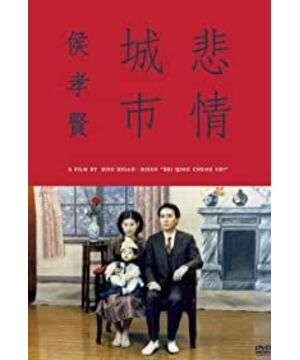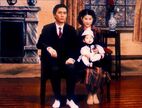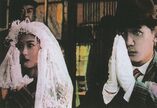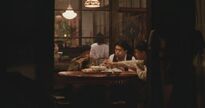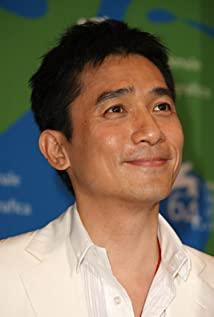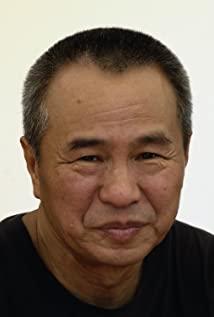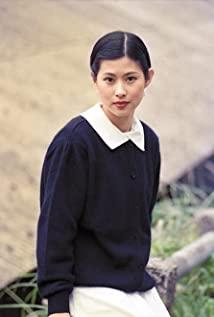In the past 1980s, some people obviously did not understand this, and they naively cherished artistic conscience as life, and they also paid a heavy price for this. It is also because of the innocence of these people that the public can see the dawn before the dawn of the Chinese literary and art circles, although this dawn is fleeting. For example, Zhang Yimou's film "Alive" and Tian Zhuangzhuang's "Blue Kite" are typical of some works of that period. These two works put a person or a family into a certain history or a certain event, and show the insignificance of the little person and the absurdity of history through the ups and downs of personal fate or the rise and fall of the family. The reason why I took out the above two films to talk about things is that their theme style is somewhat similar to Hou Hsiao-hsien's "City of Sadness", and also because the subject matter is sensitive, it has caused controversy in all walks of life. The difference is that "City of Sadness" not only was not banned, but also did not make any changes in the nearly 3-hour plot. It is said that "City of Sadness" is Taiwan's first film to win an international film festival, but the first two films that also won the award have not escaped the fate of being banned. If the ideology is left aside, is there an implicit recognition and respect for authority and truth?
As we all know, the biggest feature of Hou Hsiao-hsien's films is to spread his film ideas and concepts with the most natural lens language and the most fluent story structure based on the history and culture of Taiwan. "Lian Lian Feng Chen" and "Sad City" are the same.
Compared with the aria-like mournful but not hurtful elegy of "A Love in the Wind", "Sad City" incorporates more criticism of the historical pain and compassion for the characters' encounters. It captures a special historical period in Taiwan and tells the tragic fate of the four brothers of Lin Wenqing's family.
Japan was defeated and retreated, and the Nationalist government took over power. During that special period of political instability, dragons and snakes were mixed, and the old and new forces of all factions wanted to take advantage of the muddy waters for profit. In the process of rescuing the third child, the eldest tragically died under the gun of the gangster. The current situation is chaotic and people are panicking. Whoever sticks to the bottom line in this game without rules is the loser. Obviously, the eldest and the third are not insidious enough, and it is inevitable that they will be eliminated. People's hearts are not ancient, and moral decline is a typical manifestation of that period.
The second child was recruited and went to Nanyang, but there was no news. The fourth Lin Wenqing, played by Tony Leung, is a mute and an alternative to the Lin family. Contrary to the impetuousness and impulsiveness of his brothers, he has a bookish temperament and a quiet heart that are incompatible with this family. Therefore, he left the family business and ran a photo studio alone. As a result, he met a group of enthusiastic young people who were full of confidence in the future of Taiwan after its liberation. They were implicated and executed by the government. Here, the film does not shy away from reproducing the extremely bloody repression incident in Taiwan’s history—the February 28 Incident, objectively revealing that in order to maintain stability, those in power, while advocating a policy of tolerance and kindness on the radio, secretly and cruelly suppress the aspirants. The hypocritical face of the gentleman.
Due to its unique geographical location, Taiwan has been coveted by many overseas forces. It has been occupied by Spain, Portugal and Japan successively. "Without the skin, the hair will be attached". The fate of the Taiwanese people is like the rain hitting duckweed, swaying in the wind and rain. In the process of changing hands, they lost their sense of belonging. When those insightful people in the film sang "The Trilogy in Exile", they Questions about his own roots and worries about his unpredictable future have been pushed to the extreme.
The wide beauty played by Xin Shufen is a quiet part of the turmoil in the film. Her sweet smile and intrepid mentality endow the film with the beauty of tragic and low-spiritedness. The dialogues in the film are slowly expressed through wide and beautiful mouths, and most of the beautiful scenery is also shown from a wide and beautiful perspective. As he himself said, being able to protect his son and husband Wenqing is already the greatest happiness, but in this irrational age, even the minimum survival requirements cannot be guaranteed.
Hou Hsiao-hsien, with his sincere film language, calm and objective picture texture, and epic grand and low-pitched sympathy tone, made "City of Sadness" break away from the nostalgic plot and nostalgic charm of his past self-inflicted self-indulgence. Make his film art into a higher realm.
The film begins when the eldest son is born, and ends with Kuan Mei raising his son alone. There are deaths and new births every day, and life goes on, but people are just a drop of water in the long river of history. Stumbling forward. that is it.
View more about A City of Sadness reviews


